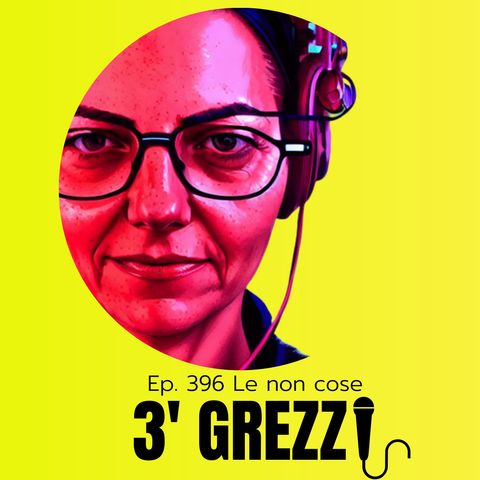3' grezzi Ep. 396 Le non cose

Descarga y escucha en cualquier lugar
Descarga tus episodios favoritos y disfrútalos, ¡dondequiera que estés! Regístrate o inicia sesión ahora para acceder a la escucha sin conexión.
Descripción
Un libriccino velocissimo da leggere ma che rimane in testa con le sue idee profonde che ci presentano l'aspetto più inquietante della nostra realtà realtà. TRASCRIZIONE [ENG translation below] Oggi...
mostra másTRASCRIZIONE [ENG translation below]
Oggi voglio parlarvi di un libro, un libriccino di poche pagine si chiama Le non cose ed è di uno scrittore coreano che si chiama Byung-Chul Han. È un libriccino che si legge molto, molto velocemente, appunto perché è scritto in grande e poi ha poche pagine, ma ha lasciato in me veramente un'impressione profonda, perché con un linguaggio molto semplice parla di cose a cui non avevo pensato e che sono molto interessanti. Il libro inizia raccontando brevemente la trama di un romanzo giapponese, dove c'è quest'isola e gli abitanti che perdono i ricordi perdono i ricordi perché c'è una polizia segreta che impedisce loro di ricordare, allora loro nascondono i ricordi, però la polizia arriva e li porta via. Arrivano addirittura a dimenticare i ricordi delle parti del corpo un po' triste e un po' anti utopico, perché poi traccia dei paralleli, lo scrittore, tra questo romanzo giapponese e il presente che noi stiamo vivendo.
Il presente dove le cose noi non ricordiamo più ma stiamo perdendo gli oggetti, stiamo perdendo le cose concrete e stiamo sostituendo tutto con il digitale. Non cerchiamo più di ricordarci le cose, le mettiamo via in modo digitale, così da non doverle ricordare. È una riflessione, diciamo che da un certo punto di vista è banale perché non facciamo altro che ripetercelo, viviamo nell'epoca dell'informazione e le informazioni sono la cosa più importante. Però questa analisi è molto piccola, molto concreta, anche.
Mi ha fatto proprio riflettere sul fatto che io ricordo solo un numero di telefono a memoria, è quello della casa dove abita mia mamma, che è immutato da quando ero bambina alla scuola elementare, ma a malapena ricordo il mio numero di telefono, se passa un po' di tempo che non lo ripeto e qualcuno me lo chiede, devo un attimo fermarmi, altrimenti proprio non non lo so più a memoria, perché faccio affidamento sul fatto che non ho più nemmeno un'agendina, tutti i miei numeri di telefono sono raccolti - come con tutti - all'interno del mio cellulare.
Un altro esempio è il fatto che non esistono più il cielo e la terra reali ma parliamo di cloud, parliamo di Google. E un'altra cosa che mi ha fatto riflettere su questo libro è il fatto che ormai la nostra generazione è una generazione senza mani perché non afferriamo più gli oggetti, la nostra è una generazione col dito per cliccare per a indichiamo col dito per cliccare, per scegliere. Quindi non passiamo più il tempo a riflettere sugli oggetti tenendoli in mano, noi effettuiamo delle scelte. E sì, è un libro un po' inquietante.
TRANSLATION
Today I want to tell you about a book, a tiny book of a few pages called Non-Things and it is by a Korean writer called Byung-Chul Han. It is a little book that can be read very, very quickly, precisely because it is written with large font and has few pages, but it really left a profound impression on me, because in very simple language it speaks of things I had not thought of and which are very interesting.
The book begins by briefly recounting the plot of a Japanese novel, where there is this island and the inhabitants who lose their memories, lose their memories because there is a secret police that prevents them from remembering, so they hide their memories, but the police arrive and take them away. They even come to forget the memories of the parts of the body. It's a little sad and a little anti-utopian, because then the writer draws parallels between this Japanese novel and the present that we are living.
The present where we no longer remember things but we are losing objects, we are losing concrete things and we are replacing everything with the digital. We no longer try to remember things, we put them away digitally so we don't have to remember them. It is a reflection, let's say that from a certain point of view is trivial because we keep repeating it to ourselves, we live in the age of information and information is the most important thing.
But this analysis is very small, very concrete, too. It really made me think about the fact that I only remember one phone number by heart, it's the one of the house where my mom lives, which hasn't changed since I was a child in primary school, but I barely remember my own phone number, if it passes a while since I repeat it and someone asks me, I have to stop for a moment, otherwise I really don't know it by heart anymore, because I rely on the fact that I no longer even have an address book, all my telephone numbers are collected - don't we all? - within my mobile.
Another example is the fact that the real heaven and earth no longer exist but talk about the cloud, we talk about Google. And another thing that made me think about this book is the fact that our generation is a generation without hands because we no longer grasp objects, ours is a generation with the finger to click, to point, with the finger we click, we choose. So we no longer spend time reflecting on objects while holding them, we make choices. And yes, it's a bit creepy.
Información
| Autor | M. Cristina Marras |
| Organización | M. Cristina Marras |
| Página web | - |
| Etiquetas |
Copyright 2024 - Spreaker Inc. an iHeartMedia Company

Comentarios
Severino
hace 1 año
Severino
hace 1 año